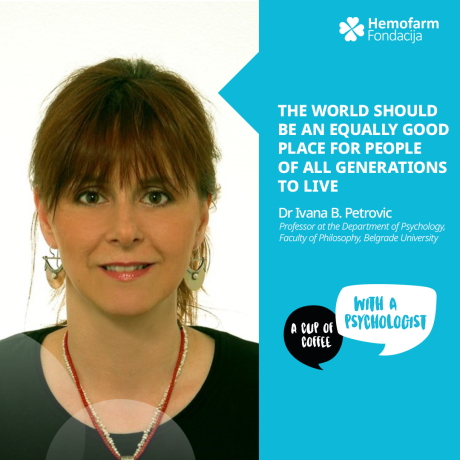
13/12/2021
Old Age and Aging – without Rules, but with Rights
Prof. dr Ivana Petrovic
Department of Psychology, Faculty of Philosophy, Belgrade University
Old Age and Aging – without Rules, but with Rights
In recent days, I have received a couple of times a photo of a ‘doormat for people over 60’ on social networks, reminding people to take keys, glasses, mobile phone, wallet, to turn off the iron. I would laugh as somebody who recognized herself in such debriefing, were not I startled by the question ‘Why for people over 60...?’, Why not a doormat for the hurried, the overburdened, the forgetful, the distracted...?
Aging and long life are increasingly talked about in the modern world. The first association of long life is joy. On the other hand, the first associations of aging and old age are poorer health and loneliness. There is a series of commonly held views on the old age. However, if we describe such a stereotype to all group members, which it relates to, we unnoticedly jump into torrents of ageism. In addition, we come across them in healthcare, social protection, justice, business world, the world of entertainment and other spheres of life.
Ageism (for which we still do not have our word) is a discrimination against a group of people based on their age based on attitudes and stereotypes about their age. Today, it is mostly related to older people, but young people can also be the victims of ageism. Ageism directed to older people is based on stereotypical views of older people, the aging process and old age, on the belief that aging leads to negative changes, physical and mental decline and gloomy lonely life, without awareness of differences between people and the fact that age is not the same for everyone just as the fact that not all old people are the same.
The world should be an equally good place for people of all generations to live
Ageism leads to social isolation, which additionally contributes to poorer health. Approaches to the coronavirus-induced pandemic in the early stages were highly age-related. Longer life and aging of the population necessarily entail extension of working life. Older people are in the vulnerable position in the labour market, as unemployed, but their position is also more vulnerable when they are employed as well. The term ageism of Silicon Valley indicates an expressed age discrimination of employees in the field of information technology, digital marketing and catering industry. The world should be an equally good place for people of all generations to live. It is necessary to provide care and support for health and well-being for all generations, as well as openness in the world of work, employment and dignified work.
Fighting ageism means existence of age policies based on rights. It also means a decision and active efforts to recognize and refusing to agree to ageism. To refuse to agree to way of thinking that somebody is driving a car, that he/she is into modern fashion or falling in love ‘at that age’. And with apparently kind words like I would never say you are ... years old... emphasizing younger age as more desirable, we express prejudices and negative attitudes towards aging, we show disrespect for someone's age, we express fear of aging, and we set youth and younger years as an ideal.
Old age and Aging an integral part of life
Longer life means also more diverse, and for many greater health, social, existential and other challenges. In order for all the people to be able to accomplish their potentials during their whole life, and not only in the period of growth and development, it is necessary to look at the old age as an integral part of life.
Social support for active and healthy aging
At the broadest social level, support for active and healthy aging is necessary. It is necessary to change the attitude towards aging, to accept old age in all its diversity, to forget about stereotypes when it comes to the elderly and to approach them as individuals. We need good will and wisdom to support family members, neighbours, colleagues, friends and strangers to use their potential to the fullest in later years, to enjoy life and make life more beautiful for themselves and the people around them and the wider community.

AUTHOR
Prof. dr Ivana Petrovic
Department of Psychology, Faculty of Philosophy, Belgrade University